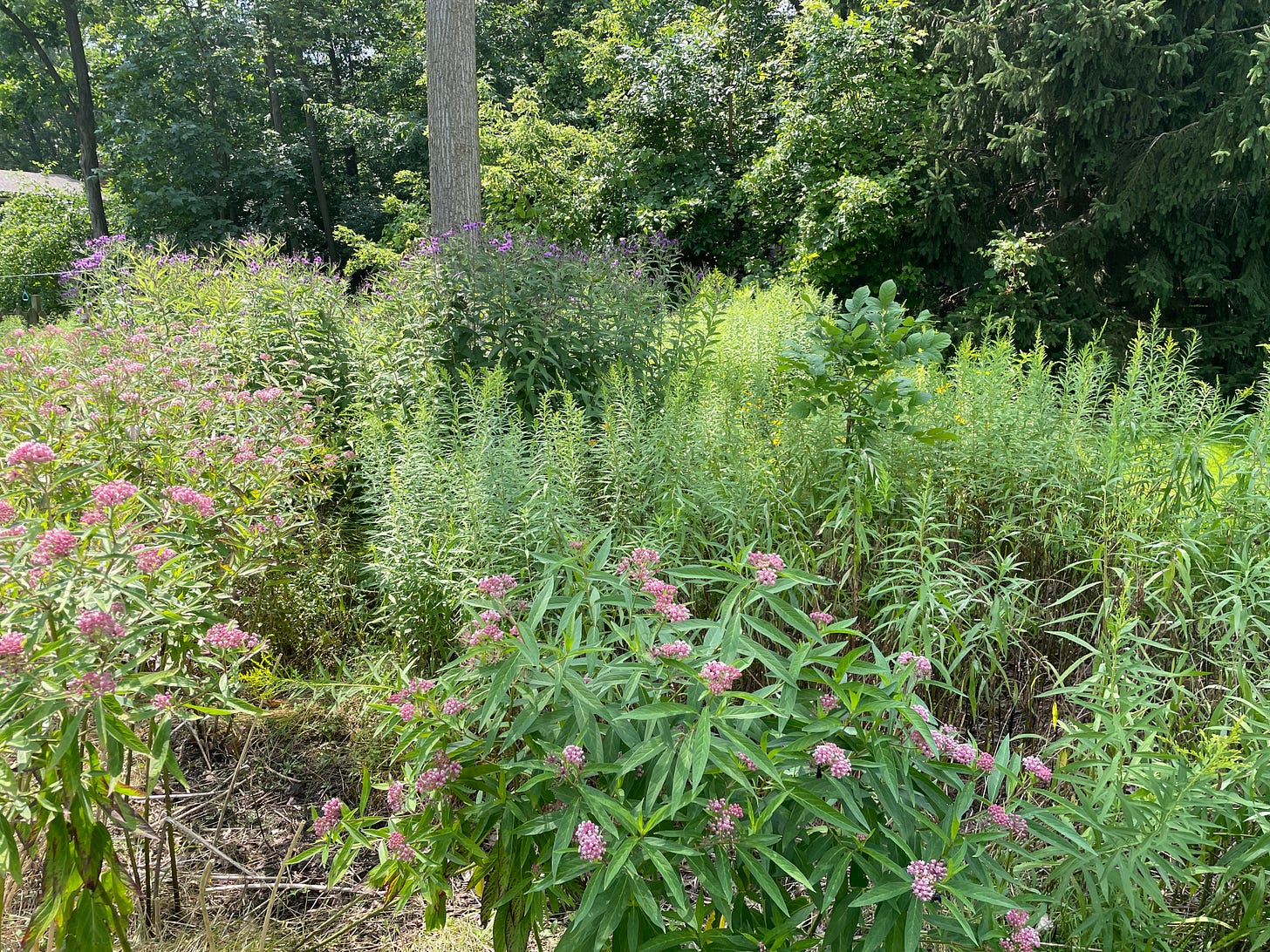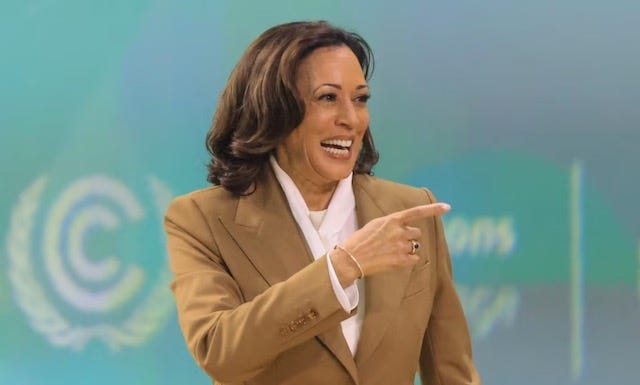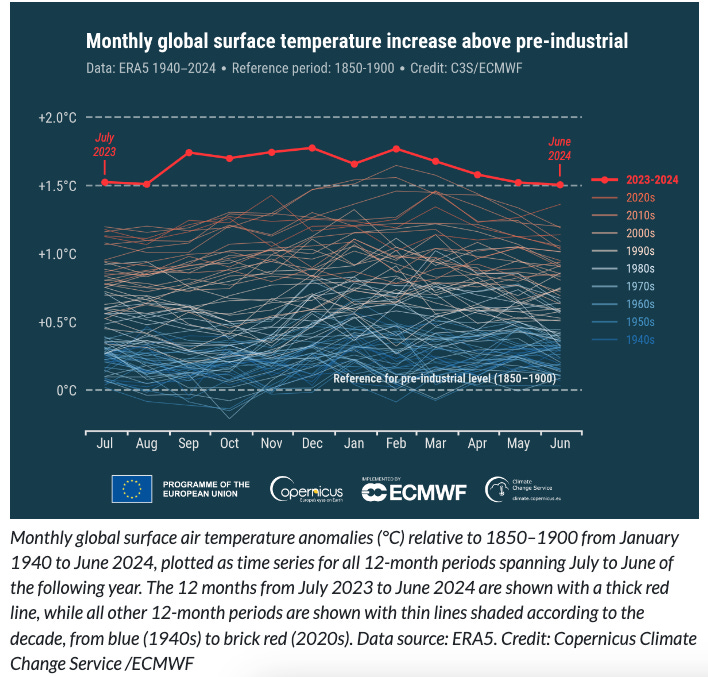Refugia Newsletter #73
Kamala Harris and climate policy, record temps, solar savings, a French refugia for refugees, and sperm whale chatter
Refugia News
Whew! What an eventful two weeks it has been! The big news, of course, is President Biden’s decision to withdraw from the US presidential race, along with the incredible outpouring of energy and support for Vice President Kamala Harris as the presumptive nominee for the Democratic ticket. This turn of events has important climate implications, which I’ll summarize a bit below. And wow, this news has made me much more hopeful about the future. How about you?
For academics like me, the beginning of August is when we face the reality of the upcoming academic year. I’m working on course preparation in earnest now, alongside refugia-related writing projects. Tomorrow, I’ll be visiting the lovely St. John’s Episcopal church in Midland, Michigan. They’ve been reading Refugia Faith, and I’m eager to talk with them. Their rector, Alissa Anderson, is a former student, which makes me feel both proud and … old.
I know, I know: another photo of native wildflowers?? I can’t help it: it’s peak season! This is our backyard refugium—check out the swamp milkweed and Missouri ironweed in bloom! Gorgeous! The pollinators certainly think so.
This Week in Climate News
Kamala! All other climate news pales in comparison to this seismic shift in American politics. The climateratti is, fair to say, pretty thrilled about Harris at the top of the Democratic ticket. While Biden is receiving well-deserved credit for the landmark and historic climate legislation he managed to get passed, Harris is looking even more promising as a climate champion. We have reached, as one article put it, “an inflection point in the campaign for climate-oriented voters.”
Austyn Gaffney, for the New York Times, summarized Harris’s record briefly:
As California’s attorney general, she prosecuted polluters, and as a U.S. senator she cosponsored the Green New Deal, a resolution that called on the nation to pivot away from fossil fuels but that never passed the Congress. During her time as vice president, she helped broker the largest climate deal in U.S. history, the $370 billion Inflation Reduction Act of 2022.
For more details on Harris’s record, read this article in Vox, and this article in Inside Climate News, which includes Harris’s own statements.
Harris representing the Biden Administration at COP28 in Dubai last December. Image credit: voanews.com
The endorsements from climate groups are rolling in. Maxine Joselow of the Washington Post wrote:
More than 350 prominent climate advocates on Tuesday endorsed Vice President Harris for president, a sign that environmental leaders believe her campaign will energize like-minded voters in a way that President Biden could not.
These leaders include Al Gore, who stated about Harris, “That’s the kind of climate champion we need in the White House.”
Emily Atkin of Heated noted that the “Big Green” environmental groups signed on right away for Harris:
Harris has already received endorsements from the so-called “Big Green” groups—the political arms of the League of Conservation Voters, the Natural Resources Defense Council, the Sierra Club, and Clean Energy for America.
Not only the big groups have endorsed, wrote Atkin, but also many more environmental activist groups who had not previously endorsed Biden. And all this before the Democratic party has officially announced a Harris-inflected climate policy.
Especially crucial: the youth vote. This week, Marianne Lavelle and Keerti Gopal of Inside Climate News reported that the Green New Deal Network has now endorsed Harris. This is “a coalition of about 20 climate groups, among them the Sunrise Movement, the Climate Justice Alliance and Greenpeace.” They represent crucial leadership groups among youth climate activists; and they never gave Biden their official endorsement.
The national director of the Green New Deal Network, Kaniela Ing, remarked that they will be getting out the vote for Harris, but also working with her to shape policy: “We’re going to be right there with Kamala and we’re asking her to be right there with us, and to even spine up and embolden her platform.”
The youth vote is crucial in the fall election, and we know that youth voters care a lot about climate. The Inside Climate News article noted recent research on younger voters’ concerns:
Research the polling firm Hart Research conducted last fall showed that 58 percent of 18- to 39-year-olds say the issue of climate change is very important to them personally, and 36 percent said it was one of the top-tier issues that matter most to them in the 2024 election.”
What about those potential VP picks? I haven’t read a lot yet. This article gives a brief overview. What do you think?
Deeper Dive
No doubt you’ve been reading about record heat this summer. Olympians, for example, have been trying to deal with temps in the upper 90s Fahrenheit at the Paris Olympics. But upper 90s is still relatively manageable compared to some regions, where temperatures in the 110s and even 120s have been recorded. Indeed, July 22 was the hottest day on earth ever recorded. We have been experiencing what 1.5C above pre-industrial feels like, since we have now completed 13 months of average global surface temperatures of 1.5C above the pre-industrial average.
This does not mean we have blown past the Paris Agreement goal of 1.5C—yet. That would require maintaining this average over decades (Apparently? There’s no official arbiter of this, as far as I know.) Even so, it’s been a long, hot haul.
Here’s a visualization from Copernicus of global surface temperatures for the last 84 years. The 12 months (as of the end of June) are shown with that scary red line on top:
You can visit the Copernicus website for more of the science on how these calculations are made, as well as for data on sea temperatures and sea ice.
In the US, the extreme heat has been concentrated in the Southeast and West. This July 8 prediction from Yale Climate Connections for mid-July shows who was likely to take it the hardest during mid-July.
Of course, this is just heat. We’re not even talking here about the flooding and tropical storms and hurricanes this summer is bringing to other parts of the country and the world.
This is no time for climate skepticism, eh? So why does it persist? Well, for one thing, some areas of the world are affected less than others. Here in West Michigan, we’ve had a beautiful summer. It would be easy, without the immediate, visceral experience of extreme weather, to imagine that climate change is not happening, or is not a big deal. But of course, there are other reasons that climate skepticism still plagues us. This video by the entertaining and reliable Simon Clark helps explain how climate skepticism is actually promoted purposefully—and subtly adjusted—by those who benefit from it.
What can churches and faith groups do about this? Among other things, we can address immediate needs by becoming helpful sources of support and resilience in our communities. If you live where the heat has been especially bad, for instance, take a look at this article from the folks at Blessed Tomorrow about how to create heat relief/cooling centers. There are further resources here, too.
We faith communities can also model good practices in supporting an energy transition. Jeff St. John of Canary Media reported this week on faith communities who are saving money by going solar, using support from the Inflation Reduction Act for nonprofits in order to finance the equipment.
Speaking of saving money, I would like to report that my home electric bill for June 25-July 24 was $17. And that was all grid fees. We essentially paid nothing for power, thanks to our solar panels and heat pump (which also serves as air conditioner) plus net-metering credit. In fact, we are building up credits right now to be used later this year when our panels aren’t making as much electricity. Keep in mind that we run air conditioning and charge two electric cars, friends. Admittedly, as I mentioned, we’ve been enjoying lovely summer weather and long summer days. Still: solar panels and heat pumps are AWESOME!
Refugia Sighting
For our sighting this week, I want to reach back to an article in the January 2024 issue of The Christian Century. The article, by Century Senior Editor Amy Frykholm, describes the Maria Skobtsova House in Calais, France. The house serves as a place of safety and gentle assistance for refugees seeking asylum in the UK. (Calais is right across the English Channel from Dover, England.)
The house was founded in 2016 amid a huge surge of refugees from the Middle East, Africa, and Afghanistan. It started as a place where volunteers could stay while helping refugees in the enormous camps, but it became clear that some refugees are especially vulnerable, such as women, women with children, unaccompanied minors, and those who were ill. The house adjusted to welcome and house these people, too, alongside the volunteers.
Volunteers and refugees join together in the daily work of the house. Everyone is invited into a daily rhythm of Taize-style prayer if they wish. The goal is to create safety, calm, support, resources—an “architecture of care” amid the chaos of insufficient and even hostile government responses to the refugee crisis in Europe. Staff assist the refugees in seeking asylum, uniting with family, receiving medical treatment—whatever is needed.
A volunteer at the Maria House. Image credit: refugeehousecalais.org.
It’s a great model of refugia—a spontaneous response to extreme crisis. The Maria House is one of many nodes in the informal network of refugee support in France, surviving on minimal resources and less-than-robust favor from French authorities.
Speaking of migration and refugees, your faith group may be in a place that will be receiving climate refugees sometime in the future. If you want to think about how your group can prepare for this, you might want to look at the excellent resources published by Creation Justice Ministries:
As many as 30 million climate-displaced migrants could come to the U.S. border over the next 30 years. How is your church preparing to welcome these refugees? What small changes can you make in your church to be more welcoming and hospitable to displaced people? In the long-term, what large changes can you make?
Climate migration is not just international, of course; it includes internally displaced people as well.
Check out this “story map” on Climate Migration for faith groups.
The Just-Now Machine
Three fun things to round out today’s newsletter.
Actually, I don’t know if this first one is “fun,” but it felt good to write it. This is an essay I wrote last week in response to the news of Harris’s rise to the top of the Democratic ticket. I kind of got in touch with anger and joy at once. The title is “Hell Hath No Fury Like a Nation Full of Angry Women,” and the post got a LOT of response. See what you think.
Image credit: Noah Berger/AFP via Getty Images/npr.org
Second: something you really don’t need. Shakespeare quotations on the weather. This is the sort of thing that comes across my feed as a professor of early modern literature. Here’s a sample, from A Midsummer Night’s Dream, about weather disruption caused by the fairies Titania and Oberon quarreling with each other:
The seasons alter: hoary-headed frosts
Fall in the fresh lap of the crimson rose,
And on old Hiems’ thin and icy crown
An odorous chaplet of sweet summer buds
Is, as in mockery, set. The spring, the summer,
The childing autumn, angry winter, change
Their wonted liveries, and the mazèd world
By their increase now knows not which is which.
Do you suppose it would help to talk about climate change in iambic pentameter?
Finally, the best for last: sperm whales! Please enjoy this beautiful video describing what scientists are learning about how sperm whales communicate.
Image credit: noyocenter.org
That’s all for this week. Thanks for reading. Till next time, be well.
As usual, bold type in quotations is added unless otherwise indicated.











THIS. Debra, you have nailed it - a "sudden, joyous release of anger." I felt it, too. OH, did I feel it. Thank you for putting words to the feeling. I've experienced that whole, awful list of negative behaviors towards women that you listed, and I. AM. FED. UP. I think it's time we let the women take charge. We're LONG overdue.
“And wow, this news has made me much more hopeful about the future. How about you?”
Yes! 💚